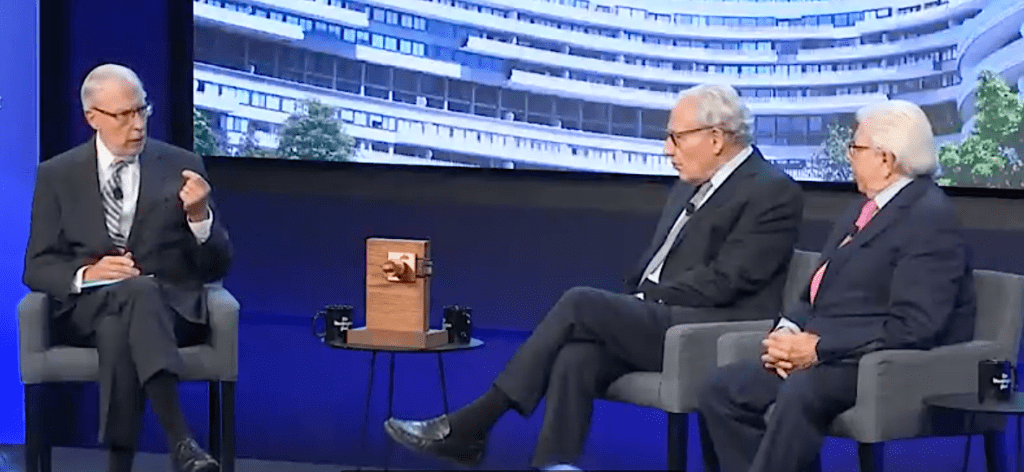Only in D.C.: Watergate, Title IX Reviewed 50 Years Later, In Person
By • June 27, 2022 0 7495

Only in D.C. During the past two weeks, Georgetowners personally have experienced a plethora of historic events happening and commemorated in person just blocks from their homes and offices: the first gun control/mental health bill in 30 years by Congress, the overturning of the almost 50-year old abortion rights bill Roe vs. Wade by the Supreme Court. Add to the list two top issues with 50th anniversaries in which some Georgetowners had been deeply involved and were available to talk about in person: Watergate and Title IX. Both were debated last week in panel discussions with new documentary films.
The two famous Watergate reporters Bob Woodward (a decades-long Georgetown resident) and Carl Bernstein (a native Washingtonian) sat down at the Washington Post conference center on June 17. Title IX was discussed at various events across town, including the National Democratic Woman’s Club on Dupont Circle. The half-century commemorations touched on how the two epic issues had evolved and their impact today.
Woodward and Bernstein with moderator Washington Post chief correspondent Dan Balz confirmed how the two then young and unknown metro reporters’ months of long-hours, door-to-door, gum-shoe journalism, became the model for investigative journalism throughout the world. Their reporting led to the resignation of President Richard Nixon – a completely unexpected outcome. “The most helpful thing about the Watergate investigative process was that we knew that someone – at least two more editors, if not the Executive Editor Ben Bradlee or Publisher Katharine Graham – were always checking,” Woodward said. That’s checking as in verification of facts, ethical procedures and vetted sources.
During the panel discussion, the Watergate reporters recounted the lessons. Whistleblower Mark Feld (aka “Deep Throat”) constantly said, at times impatiently, “to look beyond the single events we were following, to look at the big picture,” Woodward said. “ ‘Follow the money’ was the advice they followed that has become in some ways the mantra of investigative journalists today,” Balz concluded.
But the character of the reporters mattered too, and 50 years later it could be seen that the basic differences between Woodward and Bernstein — as portrayed in the film “All The President’s Men” — still prevailed. Bernstein was the one who had the epiphanies; Woodward would hold back with admonitions to seek more evidence. Fifty years later, true to character during the discussion, Bernstein quickly turned the proven incidents of betrayal and sabotage of the 1972 election that Nixon orchestrated and tried to cover up, to the assault on January 6, 2021, that a Congressional committee is trying to discover if President Trump incited. “January 6 is a story of sedition,” Bernstein said. “We just don’t know yet,” Woodward countered.
The same conflation of past and present hot issues was also true in many of the presentations about the history of Title IX — the law that was stuck into an omnibus education bill on June 23, 1972, that prohibited discrimination based on sex in education programs or activities that received federal funding.
It was toasted by Rep. Debbie Dingell (D-Mich.), a longtime Georgetown University supporter and alumna, and Rep. Ayanna Pressley (D-Mass.) at the Woman’s National Democratic Club on June 23 as the legal basis for expansion of women’s sports in high school and college and for equal pay. “We’ve accomplished so much,” Pressley said passionately. “But there is so much more work to do.”
“Originally the focus of Title IX was for equal opportunity in college programs,” said Heather Booth, one of the still highly energized leaders of Title IX. “We turned it into a movement based on civil rights. But the battle to enlarge women’s athletic rights was controversial. For years, university athletic departments tried to be exempted from Title IX, largely because of the large expenditure on male sports such as football that could not be equalized with numerous smaller women’s sports. Booth helped to found an organization “Call Jane” that became a movement and is depicted in the abortion rights film of the same name as well as another, “The Janes.”
Title IX is evolving also. The term “sex” discrimination is being changed to the broader term “gender” amid the escalating issue of gender identity, gender rights and recognition of transgender athletes.
A half -day conference on June 17 at the Martin Luther King library featuring Education Secretary Miguel Cardona as the keynote speaker and 20 women panelists, focused four of the five sessions on gender identity and gender equality issues.
“There are different generational beliefs about gender identity,” education historian Jo Freeman told the Georgetowner at the WNDC event. But she did not think that the gender identity focus would take away from the importance of Title IX to women’s equal opportunity everywhere.

